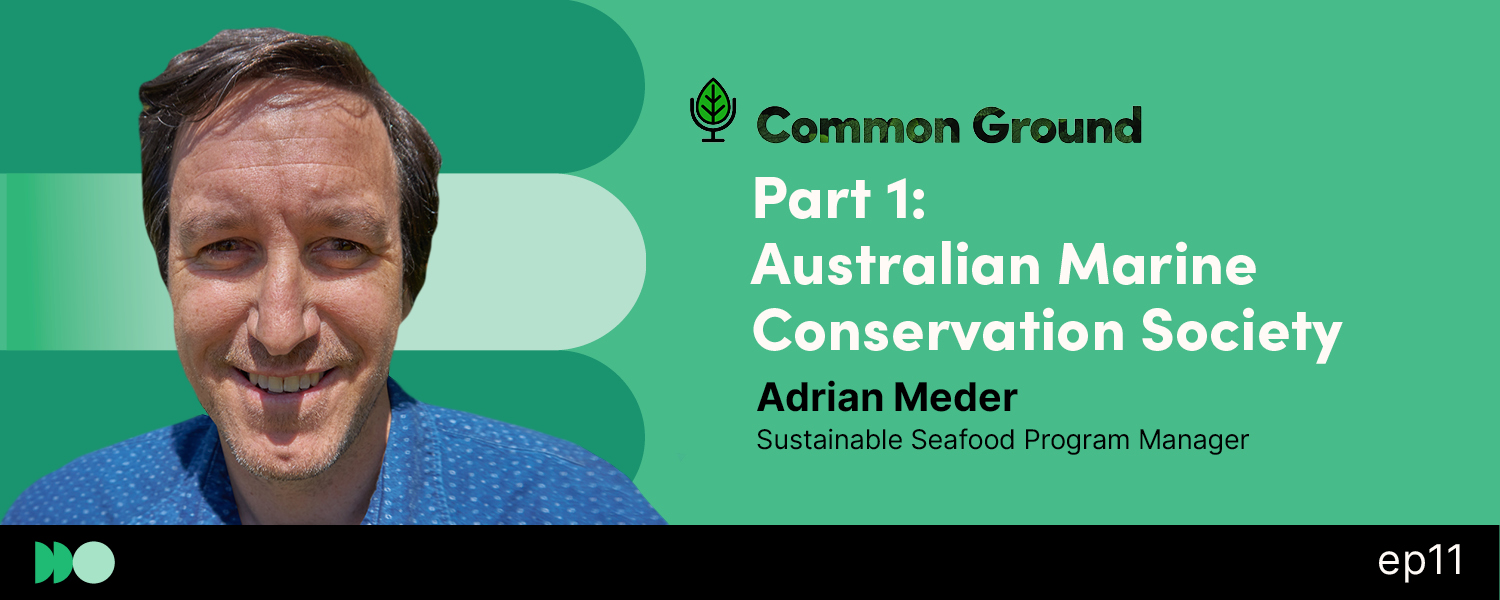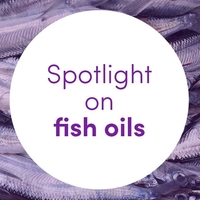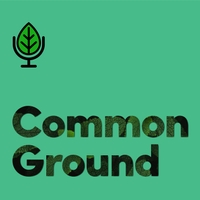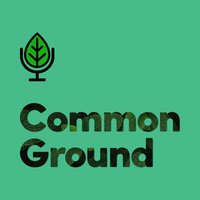
Listen on Amazon music | Apple Podcasts | Google Podcast | Spotify
Transcript
Jacqui Fahey (00:04):
Welcome to Common Ground, a podcast series discussing new research and interesting projects in the field of complementary medicine. Hello, my name is Jacqui Fahey, Head of Education at vital.ly
vital.ly is a digital platform, a professional health resource, and a distribution service all in one.
Firstly, I'd like to begin by acknowledging the Gadigal people of the Eora nation as the traditional custodians on the land on which we gather here. I would also like to pay my respect to their elders both past and present.
The ocean covers 71% of the earth surface and is crucial for environmental and human health. According to the 2020 SOFIA report, the world's appetite for fish and fish products shows no sign of slowing.
The fisheries and aquaculture (also known as aquafarming sector) has significantly expanded since 1990 to 2018, where there was a 527% rise in global aquafarming production and 122% rise in the total food fish consumption. Aquafarming is the farming of fish, crustaceans, molluscs, aquatic, plants, algae, and other organisms. It involves cultivating freshwater and saltwater populations under controlled conditions, and can be contrasted with commercial fishing, which is the harvesting of wild fish.
Fish oil is the key ingredient in the growth of the aquafarming industry across the globe. Fish oil is derived from the tissues of oily fish that contain omega three fatty acids, such as EPA (eicosapentaenoic acid) and DHA (docosahexaenoic acid). Omega three fatty acids are largely used in the segments of aquafarming, animal nutrition and pet feed supplements and functional foods, as well as in infant formulas and pharmaceuticals. In humans and omega three fatty acids provide benefits to human health, especially for metabolic functions, such as cardiovascular health, inflammatory and immune responses and they also play a key role in the proper functioning of the nervous system.
The growing awareness among the medical professions and public about importance of omega three fatty acids has led to a significant increase in fish oil consumption.
Jacqui Fahey (02:33):
The production of omega 3 lipids from fish sources does have some drawbacks, such as complex purification procedures, unwanted contamination by environmental pollutants, such as dioxins, methylmercury and microplastics, along with radiation concerns and reduction or even extinction of certain species of fish and aspects related to sustainability.
Australia's Therapeutic Goods Administration (TGA) sets minimum standards for public consumption of heavy metals. However, recent research shows that even the minimum standards are not always being met. Plus Australia does not have compulsory testing for radiation isotopes. So there is even more reason to know about our sources of fish and fish products.
In this podcast today, we should be clarifying where the industry is at and some tips to keep in mind when purchasing fish and or fish oil products.
Jacqui Fahey (2:33):
Over 55 years ago, the Australian Marine Conservation Society (AMCS) was formed by a community of scientists and Australian ocean conservationists who came together to take action to protect our marine life. AMCS is an Australian environmental not-for-profit organisation. They have protected critical ocean ecosystems with marine reserves around the nation, including Great Barrier Reef. They have led the movement to ban whaling, stopped super trawlers and protected threatened and endangered species like the Australian sea lion. Their first major campaign commenced in the mid 1960s when they legally contested and successfully defeated an application to mine coral on the great barrier reef. This victory was followed by Australia's largest sea based campaign, which culminated in the formation of the great barrier reef marine park world heritage area, an international tourist destination and one of the natural wonders of the world. Since this great endeavor, AMCS has continued to secure the protection of habitats and species throughout Australia's oceans.
Joining us today on Common Ground is Adrian Meder, Sustainable Seafood Program Manager from AMCS.
Welcome Adrian to Common Ground.
Adrian Meder (3:53): Thanks Jacqui, great to be here.
Jacqui Fahey ( 3:56): Adrian, could you tell us a little about the history of the Australian Marine Conservation Society and what the organisation does?
Adrian Meder (04:04):
Yeah, sure. Just before I start off, just like to acknowledge the Wardandi clan of the Noongar people on whose land I'm speaking to you today, this always was, always will be Aboriginal land, and I'd like to acknowledge elders past, present and future.
Australian Marine Conservation Society as you said in your lovely introduction, we originally formed as a bunch of scientists who got together some 50 or more years ago when there was a proposal to actually mine the Great Barrier Reef for, for limestone. They put a stop to that and then not so long after there was a brilliant proposal to drill the Great Barrier Reef for oil and it became pretty clear that we needed an organisation devoted to the conservation of Australia's oceans and that's where we went to from there.
The sort of work we do nowadays the Great Barrier Reef still remains very important to us and it's become something of about battleground to move Australia further on managing what is now the greatest threat to it, which is the impacts of climate change. But we also work in the areas of water quality and pollution, marine plastic pollution and securing bit of marine park protection around Australia and the Antarctic and my little corner of the organisation which is working to ensure that the fisheries in our oceans managed sustainably and with a future and the environment in mind.
Jacqui Fahey (06:05):
And how did you Adrian get involved with the society?
Adrian Meder (06:10):
Well look often it was the ocean's been pretty central to me. I grew up on a little island with pretty much everything I could do with my spare time was in the ocean. It's given a lot to me and it's been pretty central to my health and wellbeing. So when the opportunity came to get involved first as a volunteer and now professionally I saw it as a great opportunity to, to try and give something back for all of that. And it's been a deeply challenging and very rewarding journey.
Jacqui Fahey (06:51):
Fantastic and so what is the general state of fisheries in Australia at the moment?
Adrian Meder (06:58):
Well this is a great question because so Australia does pretty well. But it's a relative, relative terms, relative to much of the rest of the world. We do really well, but in terms of managing fisheries internationally, that environmental bar is set dangerously, dangerously low. So while Australia does pretty well, we now have Marine protected areas like national parks in the sea, right through our exclusive economic zone and we're expanding those further at the moment. Many of our fish stocks have been rebuilt from some of the overfishing of the past, but look, there are still species being pushed to extinction by fishing in Australia. We're still destroying coral habitats with fishing gear and we're still overfishing and overusing our resources and polluting our waters with fish farms. So there continues to be a whole lot of work to be done.
Jacqui Fahey (08:03):
So it sounds like it's quite, can be quite difficult to enforce and perhaps police the standards. Is there a review that's done on an annual basis, or how is it managed?
Adrian Meder (08:15):
So we have sort of taken that upon ourselves. 15 or 16 years ago we started producing a sustainable seafood guide for Australians, because consumers weren't able to get this information from the government reports and the fishery information that was out there. It was difficult to watch it to digest and it didn't cover off on the key areas of sustainability. So there was a really need, real need to do that. And so that's essentially my job at the moment is to produce, assess all the fisheries in Australia and internationally that for most of the seafood in the Australian marketplace and run a very high environmental bar and ruler over all of those things.
The good news is that about a third of the seafood options in our guide are on our green list, which is pretty good more than that are on our red list, but, you know, we're setting a very high standard. Australians wouldn't think so, perhaps because Australians demand a very high standard, but if you're on the green list in our good fish seafood guide, then we can be very confident that that their seafood isn't hurting any population of protected species.
It isn't damaging any vulnerable habitats and it comes from a fish stock that is being managed carefully with enough fish in the water to be resilient to any overfishing more or environmental shocks that might happen. So we can be pretty comfortable that in as much as choosing to eat seafood goes at all, you can choose seafood with a really light touch on our oceans.
Jacqui Fahey (10:12):
We’ll be touching on that a little later in our podcast regards when we're in a restaurant say or at the fish monger, but just wanted to just quickly ask you, you mentioned the sustainable seafood program guide, how would one access that?
Adrian Meder (10:28):
You can find that online goodfish.org.au or better yet, you can download the good fish sustainable seafood guide app for your phone. So that's a handy resource to have at home.
Jacqui Fahey (10:45):
Yes, absolutely. Good tip. There is some confusion you mentioned just earlier fish farming around the practices of fish farming, some concerns that the fish, say are fed antibiotics due to lice problems, that they're extremely stressed. Some have likened to a worse life than battery hens, is fish farming all it's cracked up to be? Could you help clarify some of these concerns?
Adrian Meder (11:12):
So this is a complex area, but many of those concerns are very real. I mean, often seafood from fish farms as marketed as something, you know, very sustainable and environmentally minded but it is essentially, industrial farming and like any industrial farming, battery hen chicken farming is a great example, that can be done absolutely terribly, and it can be done in a manner that is acceptable.
So there are some advantages to fish farming and that, you know, fishing is unusual and that it's you know, catching fish from the wild is essentially hunting and often comes with some inefficiency and some damage to habitats and so on that can be avoided. But on the other hand with fish farming you have concerns over what the fish are fed, it can be quite polluting and because you have all those fish corralled in close proximity, you're going to have more challenges with diseases and so on.
And, and that can lead to misuse of things like antibiotics and so on. So there's some, there's some serious issues and there's also some mistreatment of wildlife can go on. So we've heard a lot in the Australian Atlantic salmon farming industry that seals in particular have been subject to some pretty horrendous treatment as a means of keeping them away from farming operations and out of the sea cages with official farm. So a whole lot of challenges there, but, but as I say, it's a spectrum. And on the other hand, if you don't look at things like farmed shellfish, mussels and oysters, you're looking at a fish farming method, which, which uses no additional wild fish for feed at all. They fed on the naturally occurring plankton. The fish farms don't produce significant amounts of pollution.
They very efficiently convert, essentially sunlight gets turned into, into tiny oceanic plants called phytoplankton, and then the shellfish feed directly on that. So that's a very efficient way of turning sunshine into protein. And those fish farms can either provide a habitat and the places where they're found and, and because those farms are so dependent on really good water quality, the fish farmers themselves have actually become really strong stewards of managing all the other pollution issues in the surrounding waters and it can be really champions for cleaner water. So, as I say, is that there's that full spectrum of really sustainable through to really questionable, to fairly apparent practices and our fish farming industries.
Jacqui Fahey (14:25):
So if we were to purchase fish that we asked the question say when we are in a restaurant or at the fish monger, and we enquire what location it's from, with that being from Australia or internationally and if they do mention perhaps one of the fish farms say in Tasmania, how would we know that that is best practice for looking after the fish and sustainable practices? How would one check that?
Adrian Meder (14:55):
That's where our seafood guide comes in really handy, but you know, this is challenging, because it's a difficult question. Seafood is one of the most internationally traded commodities anywhere. It passes through a lot of hands often between your plate and the ocean. And some of those questions can be difficult to answer, but the act of answering the question, the fact that Australians do ask these questions is essentially, it's the basis for why Australia's fisheries are managed relatively well because consumers demand it be so, and so by empowering yourself to just ask these questions, you know, where is this from? how was it caught? you know, was it caught in a trawl net or was it caught on a line which doesn't impact the seabed, for example as you ask these questions, you may not get the answers but the act of doing so is going to drive change and we know it does and that, that's why our program is so focused on consumers and on the chef partners we work with because the market is so important. And that, that gives us power, which is great.
Jacqui Fahey (16:18):
That is, thank you, that's very good to know. In our complementary medicine profession, small cold water fish are often used as the premium to suggest to eat, as well as for a part of a healthy diet and lifestyle and to also look out for in a fish oil supplement. What are your thoughts about this? are the small cold water fish the optimum to seek out?
Adrian Meder (16:45):
Yes, well, I mentioned the shellfish farming and how efficiently they convert essentially sunlight into omega threes, into edible protein. And that's the small cold water fish at the most efficient source of that and they concentrate those fish oils because those fish oils are actually formed and in those tiny microscopic plants and, that's the diet of those fish. So yes, for that efficiency reason, also in many of the fisheries that catch those fish are quite efficient from a whole range of points of views but one of them is that they have relatively low levels of bycatch of species that are in trouble. You know, we need to be very careful in that area, but that is a relatively efficient way to capture and gather that fish oil and those fish also tend to be pretty short lived, and a lot of the pollutants in the ocean bioaccumulate, which means let's say you're a sword fish or tuna at the top of the food chain or a shark in particular. And you eat fish that eat those little fish and at each step of the food chain the very tiny levels of pollutants, which are, you know, right through our ocean are in those fish and they build up and concentrate. So that by the time you get to being a large fish, often the recommendation is that we don't eat those large fish very often. And that's for good reason, whereas with a smaller fish, they just don't have that concentration. So, so that makes them a good source for fish oils as well.
Jacqui Fahey (18:47):
With regards to fish oil supplements, there are different certifications, so what should we be looking out for? I mean, we hear independent testing is important. Do you need to be a signatory to all the various certifications, or are there ones that we best look out for on the label?
Adrian Meder (19:07):
Now, this is a tough question. And look, I wish there was a really easy answer because my program works with the certifications a lot, and even say that the most generally highly regarded one, which is the Marine Stewardship Council certification. We have seafood with that certification on our green list. It's very sustainable and also on a red list because those fisheries have the certification but still have very serious environmental issues of one sort or another. So that's a real challenge is that it would be so good to just have absolute confidence in some or all of these certifications but I guess it's my job to, to look through that and interrogate that a little further. They're almost always beneficial but the scale of the challenges facing our oceans is such that even with these certifications, they can still be problems.
Adrian Meder (20:10):
But certainly with some of these certifications, so some benefits of the Marine Stewardship Council, as one as that, they ensure that because those small cold water fish are such an important part of their ecosystem. So their ecological role is essentially to the food for whales, for dolphins, sharks and sea birds, all kinds of wildlife. So it's really important that if we're going to catch those fish, we need to leave enough of them in the water, so that not taking away, that's really important food source for that, the rest of the ecosystem depends on. And so certainly it's a requirement of the Marine Stewardship Council certification and some of the others that a much smaller fraction of those fish can be taken out for use in fish oil then we would allow for, for other species who you know, every species is important to, to the ecosystem, but, but these species are often absolutely key to it. So there are some benefits there.
Jacqui Fahey (21:26):
So the certifications by sounds of course are important, but it's something that perhaps we need to check in with, would you say with various certifications and or say the AMCS?
Adrian Meder (21:39):
Yeah, that's that's right. And I mean, it's, it's essentially my job and, and it's the cross I have to bear. You know I need to look at these certifications and run the ruler over them as well. And, you know at present there isn't a one size fits all approach but certainly, there's generally some good things that they are achieving and it's just falls on me and our good fish program to interrogate those a little more deeply.
What I would say is that some of those standards address an area in which my program doesn't, which is so we focus entirely on environmental conservation but there are other elements to sustainability, some social issues, for example, and our global fishing fleets are rife with human rights abuses, for example and, and fraudulent fish selling practices and mistreatment of workers. Some of those certifications actually run a strong ruler over those matters as well, and that's important to consider too. So credit has to be given for the progress they're making in those areas.
Jacqui Fahey (22:58):
Yes absolutely, and this, by sounds across the various certifications, a holistic approach is perhaps what's occurring from human rights issues to sustainable practices.
Adrian Meder (23:09):
Yes, and look we'd certainly be addressing those issues too, you know, if our resources were limitless and we adjust to, you know, unfortunately constrained by our capacity to do so. And, and so we stick to around it, you know, we're environmental experts, so that's our job. Yeah, those are certainly very important aspects as well.
Jacqui Fahey (24:25):
Hello listeners, thanks for tuning in today, I hope you have enjoyed listening to this podcast.....part 2 of this interview will air in our next episode where we cover further vital topics such as ocean acidification, krill oil, what alternatives to ask for in your local fish and chip shop........we also clarify what ‘wild caught’ fish is then onto microplastics, heavy metals and cleaning up the ocean.........
And finally, we share some of the Rays of light that are on the horizon.
Please subscribe to Common Ground. We appreciate your support and feel free to leave us a review. We would love to hear from you, catch you next episode.
Resources from Australian Marine Conservation Society (AMCS)
Good fish Sustainable Seafood Guide
Fish farming and sustainability.
Produced by vital.ly






